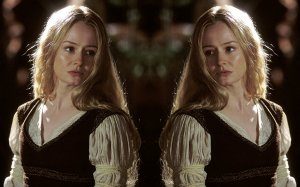Q: Did J.R.R. Tolkien Invent the Name Éowyn?
ANSWER: No, J.R.R. Tolkien did not invent the name “Éowyn”. Most Tolkien fans believe that Tolkien devised this name from two Old English (Anglo-Saxon) words, eoh (“horse”) and wynn (“joy”) but if you scan the Web long enough you will find a few sources that claim the name is Welsh in origin (Øwyn).

People who speak of the Welsh origin for the name (on various Websites) say it means “God is gracious”. I am a bit skeptical, although my knowledge of Welsh is limited to what I can find on the Internet. The Welsh word for “god” is duw and if I use an online translator to convert “god is gracious” into Welsh I get back duw yn grasol.
These same online people also say the name should be spelled Øwyn in the original Welsh, although that first letter is (so far as I can determine) only used for Irish or Scandinavian languages. A couple of online discussions link Tolkien’s name to the Irish language. One translation I can find is “young warrior”; another traces the name back to “Eógan”, supposedly meaning “born of the yew” (the Welsh word for “yew” is ywen).
If there is a Welsh version of “Eowyn” that is a girl’s name then I think it should be spelled “Eowen” (the -wyn spelling is used for masculine names). The Welsh variant of Irish Øwyn is Owain (Cf. Owain ap Urien, a 6th century Welsh prince who fought against the Saxons). Another variation on the name is Ewen, usually translated as “young”.
So this could merely be another of Tolkien’s many linguistic jokes. He devised a name using Old English elements that had an Irish/Gaelic inspiration. In Old English it means “horse joy” or “joy in horses”, which is suitable for one of the Rohirrim; in Gaelic it may mean “young warrior”, which is suitable for Éowyn’s place in Rohirric society as a shield-maiden. And this double-entendre would seem to reflect the close association the Rohirrim have with their Dunlending neighbors, whom everyone seems to agree were somehow modeled on Celtic (probably Gaelic) tribes.
What I think we can say with confidence, however, is that Tolkien did not simply make up the name.
# # #
Have you read our other Tolkien and Middle-earth Questions and Answers articles?

Mr. Martinez, I finally purchased the dvd for BATTLE OF THE FIVE ARMIES (Peter Jackson) and found the story confusing… The script that brings in Gandalf in the orc fortress, with Radagast, Galadriel and Elfond… Where did the script writers of Jackson locate this reference for a new addition to The Hobbit? I own a few of the Tolkien books and find only certain paragraphs concerning Gandalf in the added information. While looking for this input by Peter Jackson. (I have read many books and essays on Tolkien’s background, education and historical writings.) ATK
The books never say that Gandalf was captured but I believe the screenwriters justify the capture of Gandalf on the basis of his finding Thrain in the dungeon (in the books). The White Council did attack the Necromancer in The Hobbit but that was all “off stage”. Tolkien does not list the members of the White Council but he says it was composed of the leading Eldar and Istari.
Maybe Tolkien just liked the sound of Eowyn and it looked like a feminine Rohirrim-type of name to him?